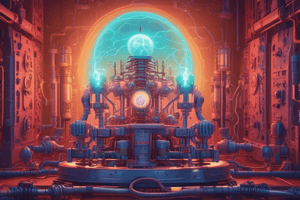Podcast
Questions and Answers
Electric charge is a fundamental property of ______, and it is responsible for the electromagnetic force, one of the four fundamental forces of nature.
Electric charge is a fundamental property of ______, and it is responsible for the electromagnetic force, one of the four fundamental forces of nature.
matter
Like ______ repel each other, while opposite charges attract each other.
Like ______ repel each other, while opposite charges attract each other.
charges
Electric current is characterized by its ______, current (I), and resistance (R), which are related by Ohm's Law.
Electric current is characterized by its ______, current (I), and resistance (R), which are related by Ohm's Law.
voltage
An electric circuit is a path through which ______ flows.
An electric circuit is a path through which ______ flows.
Electric circuits can be ______, parallel, or a combination of both.
Electric circuits can be ______, parallel, or a combination of both.
Prevent electrical hazards by avoiding ______ circuits.
Prevent electrical hazards by avoiding ______ circuits.
Flashcards are hidden until you start studying
Study Notes
Electric Basics
- Electric refers to the presence of electric charge, which can be either positive or negative.
- Electric charge is a fundamental property of matter, and it is responsible for the electromagnetic force, one of the four fundamental forces of nature.
Electric Charge
- There are two types of electric charge:
- Positive charge (protons)
- Negative charge (electrons)
- Like charges repel each other, while opposite charges attract each other.
Electric Current
- Electric current is the flow of electric charge, typically measured in amperes (A).
- It is the movement of electrons from one place to another, often through a conductor such as a wire.
- Electric current is characterized by its voltage (V), current (I), and resistance (R), which are related by Ohm's Law: V = I x R.
Electric Circuits
- An electric circuit is a path through which electric current flows.
- It consists of a power source, conductors, and loads (e.g., light bulbs).
- Electric circuits can be series, parallel, or a combination of both.
Electric Safety
- Electric shock can be fatal, so it is essential to handle electric devices and wiring with caution.
- Prevent electrical hazards by:
- Avoiding overloaded circuits
- Keeping electrical appliances away from water
- Using protective gear (e.g., insulation, grounding)
Electric Basics
- Electric refers to the presence of electric charge, which can be either positive or negative.
- Electric charge is a fundamental property of matter, responsible for the electromagnetic force, one of the four fundamental forces of nature.
Electric Charge
- There are two types of electric charge: positive (protons) and negative (electrons).
- Like charges repel each other, while opposite charges attract each other.
Electric Current
- Electric current is the flow of electric charge, typically measured in amperes (A).
- Electric current is the movement of electrons from one place to another, often through a conductor such as a wire.
- Electric current is characterized by its voltage (V), current (I), and resistance (R), which are related by Ohm's Law: V = I x R.
Electric Circuits
- An electric circuit is a path through which electric current flows.
- It consists of a power source, conductors, and loads (e.g., light bulbs).
- Electric circuits can be series, parallel, or a combination of both.
Electric Safety
- Electric shock can be fatal, so it is essential to handle electric devices and wiring with caution.
- Prevent electrical hazards by:
- Avoiding overloaded circuits
- Keeping electrical appliances away from water
- Using protective gear (e.g., insulation, grounding)
Studying That Suits You
Use AI to generate personalized quizzes and flashcards to suit your learning preferences.





